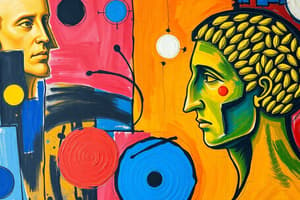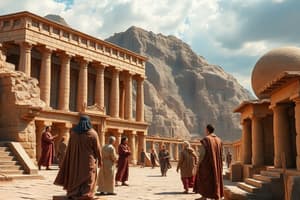Podcast
Questions and Answers
What model of the universe places the Earth at the center?
What model of the universe places the Earth at the center?
- Geocentric model (correct)
- Elliptical model
- Empirical model
- Heliocentric model
Which scientist's work provided mathematical proof for the heliocentric model?
Which scientist's work provided mathematical proof for the heliocentric model?
- Galileo Galilei
- Nicolaus Copernicus (correct)
- Johannes Kepler
- Isaac Newton
What key contribution did Johannes Kepler make to the understanding of planetary motion?
What key contribution did Johannes Kepler make to the understanding of planetary motion?
- Proved circular orbits of planets
- Developed the telescope
- Formulated Newton's Laws
- Discovered elliptical orbits (correct)
Which method did Francis Bacon advocate for scientific inquiry?
Which method did Francis Bacon advocate for scientific inquiry?
In the context of the Scientific Revolution, who is noted for creating calculus?
In the context of the Scientific Revolution, who is noted for creating calculus?
What was a significant effect of the Crusades on scientific development?
What was a significant effect of the Crusades on scientific development?
What scientific discovery is associated with James Bradley during the Scientific Revolution?
What scientific discovery is associated with James Bradley during the Scientific Revolution?
What is an example of the Liberal Arts taught in the universities during the pre-Scientific Revolution era?
What is an example of the Liberal Arts taught in the universities during the pre-Scientific Revolution era?
What was a primary outcome of the fall of the Byzantine Empire on scientific knowledge?
What was a primary outcome of the fall of the Byzantine Empire on scientific knowledge?
Which aspect of Christianity influenced European intellectual thought during the period before the Scientific Revolution?
Which aspect of Christianity influenced European intellectual thought during the period before the Scientific Revolution?
Which theory did Isaac Newton's work primarily support during the Scientific Revolution?
Which theory did Isaac Newton's work primarily support during the Scientific Revolution?
What principle did Galileo Galilei apply to assert the heliocentric model?
What principle did Galileo Galilei apply to assert the heliocentric model?
How did Copernicus's contributions differ from those of his predecessors?
How did Copernicus's contributions differ from those of his predecessors?
What was a significant characteristic of the scientific method advocated by Francis Bacon?
What was a significant characteristic of the scientific method advocated by Francis Bacon?
Which of the following figures is known for their work in hydraulics during the Scientific Revolution?
Which of the following figures is known for their work in hydraulics during the Scientific Revolution?
What significant change occurred in universities during the pre-Scientific Revolution period?
What significant change occurred in universities during the pre-Scientific Revolution period?
What did the social contract entail according to Enlightenment thinkers?
What did the social contract entail according to Enlightenment thinkers?
How did John Locke's views on governance differ from those of Thomas Hobbes?
How did John Locke's views on governance differ from those of Thomas Hobbes?
What concept did Montesquieu promote regarding government structure?
What concept did Montesquieu promote regarding government structure?
Which of the following best describes Deism as understood during the Enlightenment?
Which of the following best describes Deism as understood during the Enlightenment?
What was Voltaire known for during the Enlightenment?
What was Voltaire known for during the Enlightenment?
What major contribution did Mary Wollstonecraft make during the Enlightenment?
What major contribution did Mary Wollstonecraft make during the Enlightenment?
What economic theory did Adam Smith promote during the Enlightenment?
What economic theory did Adam Smith promote during the Enlightenment?
Which philosopher is known for creating an Encyclopedia that compiled Enlightenment views?
Which philosopher is known for creating an Encyclopedia that compiled Enlightenment views?
What was the primary focus of the social contract theory in Enlightenment thought?
What was the primary focus of the social contract theory in Enlightenment thought?
What belief did John Locke hold regarding government and individual rights?
What belief did John Locke hold regarding government and individual rights?
Which concept did Montesquieu advocate to prevent governmental abuse of power?
Which concept did Montesquieu advocate to prevent governmental abuse of power?
How did Thomas Hobbes view human nature in relation to government?
How did Thomas Hobbes view human nature in relation to government?
What was a key characteristic of the Enlightenment philosophes’ view towards religion?
What was a key characteristic of the Enlightenment philosophes’ view towards religion?
What did Adam Smith argue regarding the market's function?
What did Adam Smith argue regarding the market's function?
What was the main argument made by Mary Wollstonecraft in her writings?
What was the main argument made by Mary Wollstonecraft in her writings?
What role did Voltaire play during the Enlightenment period?
What role did Voltaire play during the Enlightenment period?
What was a major reason for the preservation of Greek mathematical and scientific texts in Muslim territories?
What was a major reason for the preservation of Greek mathematical and scientific texts in Muslim territories?
How did the educational infrastructure in Western Europe facilitate the Scientific Revolution?
How did the educational infrastructure in Western Europe facilitate the Scientific Revolution?
What key difference exists between inductive and deductive reasoning in the context of scientific inquiry?
What key difference exists between inductive and deductive reasoning in the context of scientific inquiry?
What was the main approach Copernicus used to prove the heliocentric model compared to Galileo's method?
What was the main approach Copernicus used to prove the heliocentric model compared to Galileo's method?
Which of the following best describes the significance of Isaac Newton's contributions to Physics?
Which of the following best describes the significance of Isaac Newton's contributions to Physics?
What was the primary reason Greek mathematics and scientific texts did not survive in Western Europe?
What was the primary reason Greek mathematics and scientific texts did not survive in Western Europe?
Which method was primarily employed by Galileo to support the heliocentric model of the solar system?
Which method was primarily employed by Galileo to support the heliocentric model of the solar system?
How did the educational infrastructure in Europe contribute to the emergence of the Scientific Revolution?
How did the educational infrastructure in Europe contribute to the emergence of the Scientific Revolution?
What significant impact did the recovery of Aristotle's works have on the Natural Sciences in Western Europe?
What significant impact did the recovery of Aristotle's works have on the Natural Sciences in Western Europe?
What distinguishes inductive reasoning from deductive reasoning in scientific inquiry?
What distinguishes inductive reasoning from deductive reasoning in scientific inquiry?
Flashcards
Inductive Method
Inductive Method
A method that starts with specific observations and uses them to develop general principles. It relies heavily on empirical evidence and experimentation to prove a hypothesis.
Deductive Method
Deductive Method
A method of reasoning that starts with a general truth and uses it to deduce specific conclusions. It relies on pre-established principles to arrive at new truths.
Empiricism
Empiricism
The belief that knowledge is primarily acquired through sensory experiences and observations. This emphasizes the importance of empirical data in scientific inquiry.
Rationalism
Rationalism
Signup and view all the flashcards
Geocentric Model
Geocentric Model
Signup and view all the flashcards
Heliocentric Model
Heliocentric Model
Signup and view all the flashcards
Scientific Method
Scientific Method
Signup and view all the flashcards
Newtonian Mechanics
Newtonian Mechanics
Signup and view all the flashcards
Aristotle's Rediscovery
Aristotle's Rediscovery
Signup and view all the flashcards
Deism
Deism
Signup and view all the flashcards
Social Contract
Social Contract
Signup and view all the flashcards
Consent of the Governed
Consent of the Governed
Signup and view all the flashcards
Natural Rights
Natural Rights
Signup and view all the flashcards
A Vindication of the Rights of Woman
A Vindication of the Rights of Woman
Signup and view all the flashcards
Separation of Powers
Separation of Powers
Signup and view all the flashcards
Free-Market Economics
Free-Market Economics
Signup and view all the flashcards
Invisible Hand of the Market
Invisible Hand of the Market
Signup and view all the flashcards
Nicolaus Copernicus
Nicolaus Copernicus
Signup and view all the flashcards
Galileo Galilei
Galileo Galilei
Signup and view all the flashcards
Johannes Kepler
Johannes Kepler
Signup and view all the flashcards
Study Notes
Scientific Revolution Overview
- The Scientific Revolution was a period of significant advancements in science, challenging traditional views and leading to new discoveries.
Science Before the Scientific Revolution
- Ancient Greek mathematics and science, including Archimedes, Euclid, and Eratosthenes, laid groundwork.
- The fall of the Roman Empire led to Latin-speaking knowledge, separate from Greek knowledge.
- Muslim conquests of Egypt and the Levant played a role in translating and preserving Greek texts.
- Greek texts were translated into Arabic.
- Christianity and European intellectuality emphasized reason to explain faith.
- Universities, originally cathedral schools, taught liberal arts like arithmetic, geometry, and astronomy.
- Aristotle's works were not widely studied in this era.
Science Before the Scientific Revolution Continued
- The Crusades and the fall of the Byzantine Empire fostered cross-cultural interaction, leading to the rediscovery of Greek knowledge.
- Aristotle's works were rediscovered.
- Scholasticism emphasized natural sciences.
- Figures like Albertus Magnus and St. Thomas Aquinas contributed to this period.
- A geocentric model, with Earth at the center, was the prevailing view, developed by Aristotle and later Ptolemy. This model placed the Earth at the center of the universe, with the Sun, Moon, and other celestial bodies revolving around it.
Copernicus
- Copernicus was a Catholic cleric and scientist who proposed the heliocentric model, placing the Sun at the center of the solar system.
- He dedicated his work "On the Revolutions of the Heavenly Spheres" to the Pope, showing no immediate conflict.
Galileo Galilei
- Invented the telescope, used to support the heliocentric model through empirical observations. This allowed detailed study of celestial bodies.
- Galileo's work was highly controversial, particularly challenging the prevailing geocentric view.
- Facing opposition, he was forced by the Catholic Church to retract his findings despite substantial empirical evidence, leading to a significant conflict between science and the Church.
Johannes Kepler
- Kepler discovered that the planets orbited the sun in elliptical paths, not circles, significantly refining the understanding of planetary motion.
- This discovery further supported the heliocentric model.
James Bradley
- Empirically supported the heliocentric model through observations of stellar aberration. This phenomenon, where the apparent position of stars shifts due to Earth’s motion, offered crucial proof of Earth's movement.
- He discovered the aberration of light, providing further proof of Earth orbiting the sun. He used these observations to determine the speed of light relative to Earth.
Isaac Newton
- Newton laid the groundwork for modern physics.
- He formulated Newtonian mechanics and developed calculus.
- He explained motion using three laws: inertia, force, and action-reaction. These laws provided a comprehensive understanding of how objects move. He used these laws to explain planetary motion within the heliocentric model.
Scientific Method
- Francis Bacon (Empiricism): Developed the inductive method, moving from specific observations to general theories based on empirical evidence.
- René Descartes (Rationalism): Developed the deductive method, starting with general principles to reach specific conclusions based on logical reasoning from existing truths.
Other Figures in the Scientific Revolution
- Blaise Pascal invented the hydraulic press and syringe, advancing hydraulics, and also explored concepts of probability and Pascal's Triangle.
- Andreas Vesalius, a pioneer in human anatomy, performed human dissections, leading to greater understanding and innovation in anatomical knowledge. His work was revolutionary, despite facing objections. His most influential work was De humani corporis fabrica.
Studying That Suits You
Use AI to generate personalized quizzes and flashcards to suit your learning preferences.




